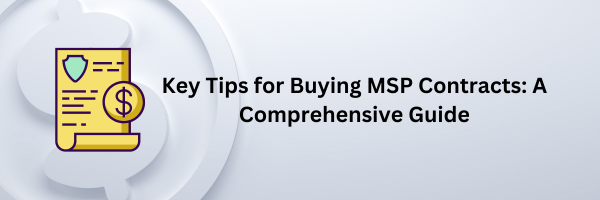Key Tips for Buying MSP Contracts: A Comprehensive Guide
Once upon a time, a wise person said, “The devil is in the details.” As you venture into the world of Managed Service Providers (MSPs), that adage becomes particularly pertinent. Neglecting the minute aspects of an MSP contract can lead to sub-optimal service delivery and unanticipated costs.
Contracts are not just paper.
Precision in understanding and stipulating the scope of services is crucial. Without clarity on deliverables, metrics, and responsibilities, an MSP contract may not effectively serve the interests of your enterprise.
Understanding MSP Contracts
Before entering into an MSP contract, it’s essential to comprehend its structure, which encapsulates the service levels, terms, and obligations on both parties. Awareness of MSP contractual nuances preempts any misunderstanding and aligns expectations with the service provided.
In assessing an MSP contract, consider the explicit Service Level Agreements (SLAs) that lay out the response and resolution times for various scenarios, alongside any warranties or guarantees. These aspects determine the reliability and accountability of the MSP and are directly correlated with the performance outcomes for your enterprise.
Ensure a thorough review of the ‘termination clause’ and ‘renewal policy’. These components dictate the contract’s longevity and the conditions under which it may be dissolved or continued, shaping the strategic flexibility of your service procurement.
MSP Essentials
Selecting a Managed Service Provider (MSP) necessitates meticulous examination of contractual elements to ensure compatibility with your organizational objectives and operational demands. The foundation of a fruitful partnership lies in clear, mutual comprehension of these contractual obligations and service expectations.
It is imperative to appraise the provider’s track record in fulfilling their commitments, seeking evidence of their capacity to deliver consistent, high-caliber services. An MSP’s history of adherence to service level agreements (SLAs) is a telling indicator of their reliability and performance standards.
MSP contracts with flexible terms accommodate evolving business needs and foster long-term scalability.
In negotiating terms, prioritise clauses that permit adjustments to service scopes and facilitate transparent communication. Ensure the contract stipulates clear metrics for performance evaluation and establishes a protocol for regular reviews, adjustments, and escalations as necessary, thus maintaining alignment with your strategic objectives.
Scope of Services
Precisely delineate the range of services, ensuring comprehensive coverage of the functions crucial to your organization’s infrastructure and operations.
The scope should explicitly define the services included, such as network management, cybersecurity measures, helpdesk support, and data backup solutions. Crucially, specific exclusions should be clearly stated to prevent misunderstandings and ensure that all parties have a congruent interpretation of the services provided. This transparent outline will forestall potential disputes and provide a solid foundation for service delivery evaluations.
Furthermore, as your business evolves, the scope may require adaptation. It is prudent to structure provisions within the contract for service scope modifications, thereby accommodating growth or change in your business direction. These adjustments should be straightforward to negotiate, with predefined parameters for how changes can be introduced and implemented.
Ultimately, the scope of services must be aligned with your long-term business strategy, supporting your operational needs and technological advancements. Any modifications to the scope should be meticulously documented and understood by all stakeholders, ensuring the MSP remains abreast of evolving requirements and continues to contribute value to your organization.
Evaluating MSP Providers
Selecting a Managed Service Provider (MSP) necessitates a thorough vetting process to ensure alignment with your corporate objectives and operational needs. Opt for providers who demonstrate robust technical expertise and an impressive track record of reliability and client satisfaction. Investigate their ability to scale services in harmony with your business growth, and ascertain that they maintain stringent cybersecurity measures to protect your assets. Moreover, assess the clarity and responsiveness of their communication channels, as this is pivotal for effective issue resolution and maintaining a cohesive partnership. It is imperative to have confidence in an MSP’s capacity to not only manage your IT infrastructure adeptly but also to enhance it progressively with innovative solutions.
Track Record and Reliability
When evaluating potential MSPs, scrutinise their historical performance and consistency of service delivery. A proven record of stability and client retention speaks volumes, demonstrating a provider’s commitment to excellence and long-term partnerships. This history is an invaluable indicator of an MSP’s effectiveness in real-world scenarios.
Ensure their SLAs have been consistently met over time. Service Level Agreements are a critical measure of an MSP’s reliability and dedication to upholding standards.
Additionally, review third-party assessments and certifications they have received. Such accreditation (like ISO standards or industry-specific qualifications) serve as validation of an MSP’s competencies and reliability.
An MSP with a history of tackling complex technical challenges successfully is likely to possess the expertise necessary to address your unique needs, thereby reducing the likelihood of service disruptions.
Consider the feedback from current and past clients about their experiences. Direct testimonials provide insight into the MSP’s operational efficiency and the robustness of their support structures. Positive feedback from customers with analogous business profiles to yours is particularly telling in this regard.
Finally, assess the longevity of the MSP’s relationships with their clients. Long-standing partnerships can imply a provider’s adaptability and resilience to the evolving technological landscape, which are crucial for the sustained support and growth of your IT infrastructure.
Support and Communication
Robust channels of assistance are imperative.
Efficient and reliable support models are fundamental to the success of an MSP relationship. It is imperative that channels of communication are always open, clear, and responsive to ensure seamless service delivery. Moreover, support should be accessible across multiple formats, including phone, email, and potentially an online portal, to accommodate varying client preferences.
Immediate response times are not just desirable; they’re essential.
In the context of support, it is prudent – especially in times of crisis – to secure guarantees regarding response times. An MSP contract should clearly define the parameters for issue resolution and establish a Service Level Agreement (SLA) that aligns with your operational imperatives and risk tolerance.
Ensure clarity on available support tiers and escalation procedures.
In planning for the unexpected, it’s critical to comprehend the different levels of support offered, encompassing both the basic helpdesk to more specialized technical assistance. Knowing the escalation pathways available will demystify the process you’ll engage with in the event of complex issues or disruptions.
Support should be an ongoing conversation, adaptive and predictive.
The significance of proactive support cannot be overstated. With the technology environment in constant flux, a forward-looking MSP anticipates potential problems and offers solutions before they escalate. Regular reviews allow for the strategic evolution of services to match your growing needs, thereby affirming that the MSP remains in lockstep with your business trajectory.
Financial Considerations
When evaluating MSP contracts, it’s essential to scrutinize the cost structures and ensure they align with your financial framework. Explicitly, consider the transparency of pricing, potential for scalability, and the implications of long-term commitments. An astute assessment of these factors will safeguard against unforeseen expenses and facilitate a controllable IT budget.
Fiscal prudence requires a thorough understanding of payment schedules, service level incentives, and penalty stipulations. Ensuring predictability in costs fortifies budgetary stability, while judiciously structured SLAs can serve to align performance metrics with financial objectives.
Cost Analysis
A decisive factor in MSP contracts is the comprehensive understanding of costs associated.
- Assess the Total Cost of Ownership (TCO): Evaluate all expenses, including initial setup, monthly fees, and potential overage charges.
- Examine Scalability Options: Consider if costs will significantly increase with business growth and service expansion.
- Prepare for Additional Fees: Be aware of hidden costs such as support charges, termination fees, or compliance audits.
- Understand the Payment Structure: Clear knowledge of payment intervals, whether monthly or annually, is crucial.
- Review Service Level Agreements (SLAs): Analyze the financial implications of SLAs and any associated rewards or penalties.
The pursuit of value should not overshadow the significance of service quality and reliability.
Careful budgeting and cost control can result in significant returns on your MSP investment, ensuring sustainable business operations.
Flexibility and Scalability
Flexibility in an MSP contract is pivotal, ensuring services can adapt to your evolving business needs.
When evaluating MSP contracts, it’s essential to consider their adaptability to changing business landscapes. Look for providers that offer scalable service models which can be easily augmented or reduced in line with your operational demands. This ensures that as your business grows or contracts, your MSP solution can adjust accordingly, maintaining efficiency without excess costs.
Equally important is the ability to modify services without incurring prohibitive fees. An ideal MSP partner provides a streamlined process for scaling services up or down, reflecting usage trends and business cycles with minimal financial or operational disruption.
Lastly, engage with an MSP that anticipates future trends and possesses the agility to incorporate new technologies and services promptly. This proactive approach not only aligns with your current requirements but also lays a foundation for future growth, ensuring that your MSP solution evolves in tandem with your enterprise, consistently supporting your trajectory towards success.
Contract Clarity and Legality
A meticulously drafted Managed Service Provider (MSP) contract lays the foundation for a transparent and efficacious partnership. It must delineate the scope of services, performance benchmarks, compliance standards, and protocols for dispute resolution within a legal framework that protects both parties. Ensure that the contract addresses data privacy, intellectual property rights, and service level agreements (SLAs) with unequivocal precision.
The process of contract review should never be trivialized. Engaging with legal counsel skilled in technology services contracts is imperative, providing assurance that the contractual obligations are enforceable and aligned with your business objectives, while also safeguarding against unforeseen liabilities.
Terms and Conditions
The terms and conditions of an MSP contract are the nucleus of your service agreement, the bedrock detailing what is promised and expected. They must be meticulously articulated to forestall any ambiguity that could breed disputes or misunderstandings.
These provisions are often dense with jargon and legalese, necessitating a thorough review by stakeholders and legal experts. Scrutinizing the fine print may unveil stipulations that need clarification, amendment, or exclusion to align with your company’s interests and operating procedures.
Guarding against autocratic termination clauses is crucial; these should be balanced to allow recourse and negotiation before precipitous dissolution of the agreement. Ensure the contract outlines a fair process for terminating the relationship that won’t leave your operations in jeopardy.
Breach of contract repercussions are not merely punitive but serve as a deterrent—consider the consequences prescribed for non-performance or SLA violations. These should be commensurate with the impacts such failures would have on your business’s continuity and reputation.
Lastly, variation clauses necessitate careful examination—they dictate the processes for contract amendments. Any change to the terms should involve rigorous vetting to maintain the integrity and intention of the original agreement.
Exit Strategy
When entering a managed services agreement, it is paramount to anticipate and codify the exit criteria.
- Outline termination triggers such as service deficiencies or contract breaches.
- Specify a notice period to allow for a strategic transition without operational disruption.
- Require the return or destruction of proprietary information and post-exit confidentiality.
- Establish transition assistance services to ensure a smooth changeover to a new provider or in-house management.
- Agree on a financial settlement structure for early termination to avoid dispute.
A comprehensive exit strategy ensures your enterprise retains agility in its IT service arrangements.
Infrastructure transitions can be complex; a well-defined exit clause minimizes risk and financial exposure.

